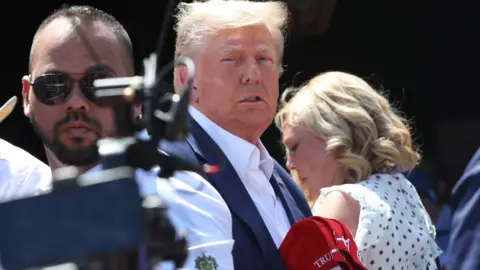Trump faces 4 March 2024 trial just a day before Super Tuesday
 EPA
EPADonald Trump, seeking a return to the White House in 2024, already had a crammed political calendar. Now, with multiple legal dramas set to unfold, it is approaching the point of pure chaos.
A federal judge has scheduled the trial for his alleged effort to overturn the 2020 election for 4 March, the day before Super Tuesday, the biggest voting day in the Republican race.
That trial - in Washington DC - would pull Mr Trump off the campaign trail for a pivotal stretch of his campaign, when he could be securing himself as the Republican standard-bearer or engaged in an extended struggle with one or more remaining rivals.
Mr Trump's lawyers have already vigorously complained about proposed trial schedules conflicting with the presidential campaign, which the former president and his supporters have branded "election interference" by his enemies.
Mr Trump has vowed to appeal the trial date ruling. In a post on his social media site, he derided the judge as "biased" and "Trump hating" and said the timing was "just what our corrupt government wanted".
Mr Trump's legal team had initially proposed an April 2026 date for the federal trial - a timeline the judge said was unacceptable.

While the first presidential nomination contest, in Iowa, isn't until January, the Republican presidential race has already begun in earnest. The party has started holding monthly debates for qualifying candidates. The first took place in Wisconsin in August - and Mr Trump stayed away, saying an appearance was not necessary given his large polling lead over his rivals.
The schedule, however, provided an early indication of how his legal concerns could factor into his political calculations. The former president appeared in an Atlanta jail the day after the debate, where he was formally booked on charges of interfering in the Georgia 2020 election.
While much of Mr Trump's legal - and political - drama will take place in 2024, there's already one trial scheduled for later this year. On 2 October, New York state's civil fraud lawsuit against Mr Trump and his business empire is scheduled to go to trial. Mr Trump is not required to appear in court, but it still could be a distraction - and it comes just five days after the second scheduled Republican primary debate.
When the calendar flips to 2024, things start to really heat up. The Iowa caucuses - the first Republican presidential selection contest - are scheduled for 15 January, the same day a defamation trial against Mr Trump begins. It is the second case brought by writer E Jean Carroll, who has already won a $5m (£3.9m) judgement from the former president after a jury found he sexually assaulted and defamed her.
Mr Trump's New York hush-money case is scheduled for trial in late March, a few weeks after the federal 6 January trial is currently on tap to begin in Washington, DC. The federal case involving mishandling classified documents is set for May. That will be after many of the key Republican primaries have taken place. But preparation for those cases, including pre-trial hearings and depositions, will begin well beforehand.
Then there is the Georgia indictment, which is yet to be scheduled.
Georgia District Attorney Fani Willis has said she wants her sprawling racketeering case against Mr Trump and 18 co-defendants to reach trial within six months, but that timeline is also ambitious, given that one defendant is requesting the proceedings be moved to federal court and a second is calling for an earlier trial.
All the presiding judges in these cases will take into consideration Mr Trump's legal concerns, as well as the campaign timeline, and attempt to work out a schedule that best accommodates all the competing interests.
In the second half of 2024, those interests include a Republican national convention that is slated for mid-July, and the traditional series of presidential debates that take place in early autumn. At some point the possibility of a trial in the shadow of November's presidential election - or even after it - becomes a real possibility.
The trials - and any pre-trial hearings, depositions and other various legal proceedings - will take up weeks if not months of Mr Trump's time. He will have to schedule his campaigning, including his beloved mass public rallies, around them. He could have judges issuing orders to limit what he can publicly say - and sanctioning him if he does not comply.
Then there's the massive financial drain that supporting multiple teams of lawyers to contest the criminal charges against Mr Trump and his associates presents. A Trump-affiliated political committee has already spent more than $40m on legal fees just in the first half of 2023, with the first criminal trial still months away.
Those numbers will only go up - and they will continue to limit the amount of money the former president can direct to the nuts and bolts of his campaign, such as grass-roots organising, television and online advertisements, and staff and infrastructure investments.
It is a daunting burden for any candidate - even one who has shown Mr Trump's remarkable political durability.